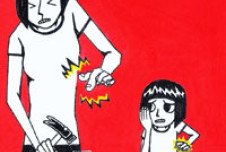"Babies not only learn more, but imagine more, care more, and experience more than we would ever have thought possible," writes Allison Gopnik, author of a fascinating recent book, The Philosophical Baby. Gopnik, a UC Berkeley child psychologist, blows the lid off centuries of assumptions about babies—namely that they lack a moral code, the ability to reason, and even, as some have argued, consciousness. Using examples from hundreds of recent studies, she demonstrates not only that babies and young children are uniquely suited to learning, but that even from a very young age children have the ability to gauge right from wrong, show empathy, and follow ethical rules.
From the time they are born, in fact, babies are wired to be keen observers. Unlike adults, who focus attention mostly on what's relevant to them, babies pay attention to everything around them, indiscriminately. Their brains are more "plastic" than an adult's and are designed to rapidly absorb a flood of information. Gopnik compares a baby's view of the world to what adults experience in altered states of attention, such as during meditation, when they are fully in the present moment. This "high consciousness" allows babies to make unique associations between objects in their environments, she argues, and has allowed humans to evolve into an especially innovative and creative species.
Babies learn about their world much like miniature statisticians, by keeping track (unconsciously) of what occurs most frequently. For example, babies quickly learn that the faces of their mothers are more important than the faces of other humans because their mothers are present and engage with them more than anyone else does.
"The methods of experimentation and statistical analysis seem to be programmed into our brains even when we are tiny babies," writes Gopnik. "Those programs allow babies, and so the rest of us, to find the truth."
Some of what scientists once thought of as merely "child's play"—like pretend play and imaginary companions—encourages children to see the world not only how it is, but how it could be. Gopnik calls this kind of learning "counterfactual," and says it as important to creativity and scientific discovery as understanding "reality." She asks, what good would a writer or a scientist be if [they] could not imagine other ways of looking at the world? The groundwork for this kind of abstract thinking is laid during childhood.
What's more, Gopnik highlights research showing that babies can understand human behavior and emotion to a surprising degree—research with provocative implications for the deep roots of human morality and goodness. In one experiment, 18-month-old toddlers who saw an experimenter struggling with a task would read his frustration and try to help. By two or three years of age, children can recognize that the goals and desires of others are similar to their own: They realize that hurting others is wrong and that breaking rules is bad, especially when breaking rules causes harm. In these and other ways, even very young children possess the building blocks of morality, empathy, and altruism—an idea once dismissed as inconceivable.
Gopnik also shows how even negative moral behavior, like stereotyping, can best be understood by observing children. From a very young age, children are able to categorize people into "in" and "out" groups based on relatively small differences, like hair color.
Ultimately, Gopnik wants her book to offer more than eye-opening insights into babies. By understanding children's minds, she hopes that parents and teachers can be better equipped to help children grow in moral character. For those interested in both understanding and promoting moral behavior, The Philosophical Baby is a great place to start. And for just about anyone, it offers an entertaining window into what it means to be human.




Comments